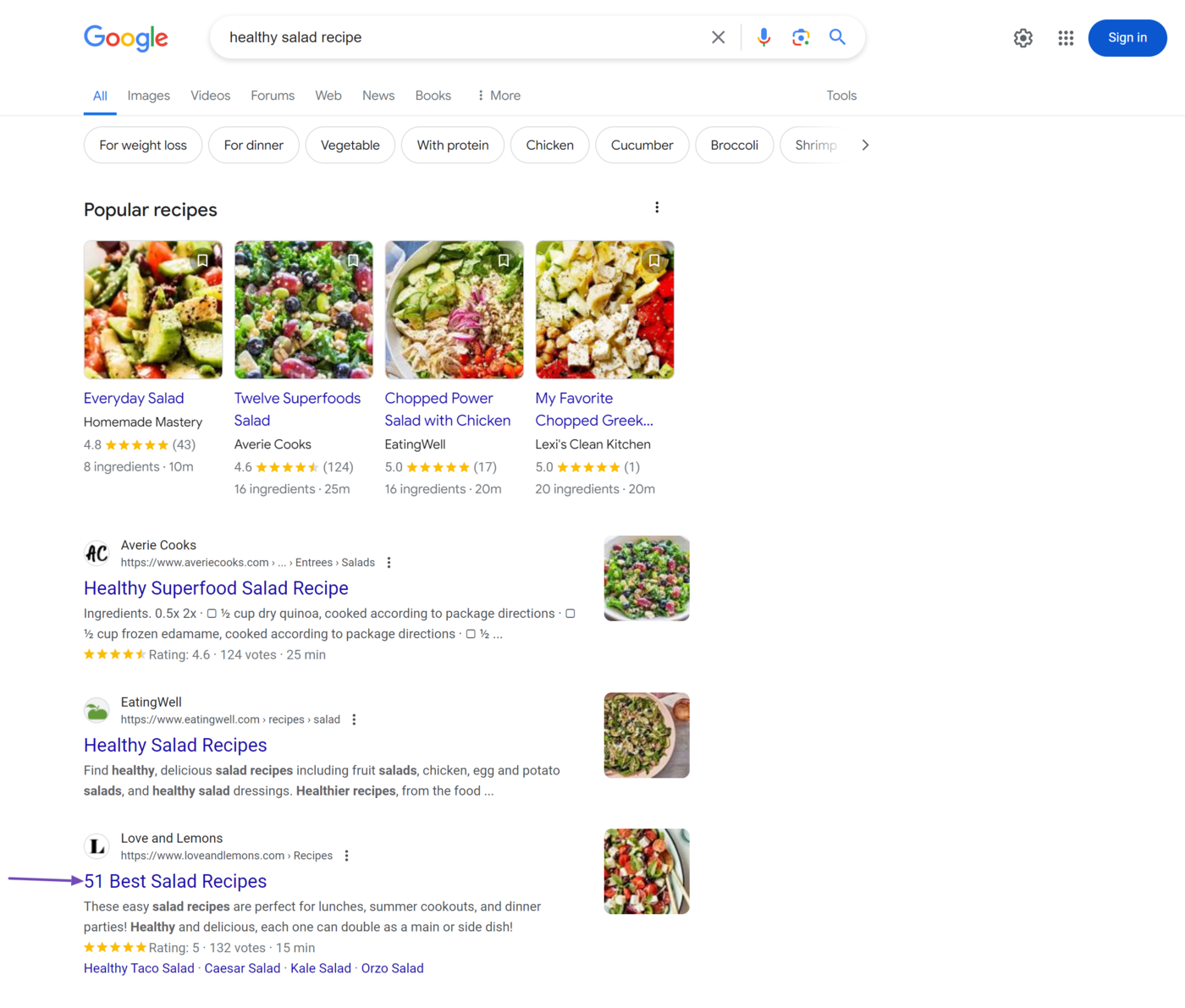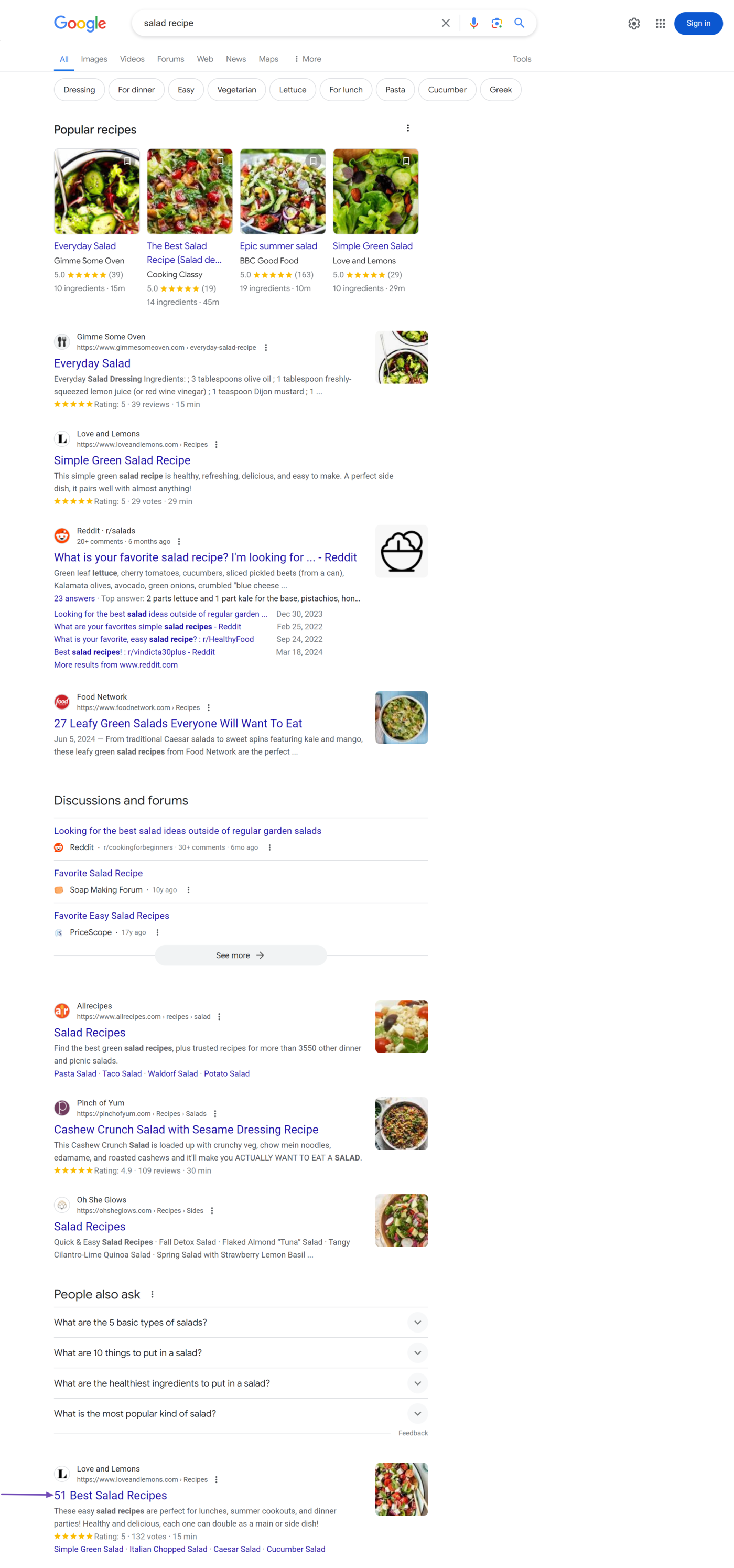What is Keyword Ranking?
SEOs and bloggers use keyword ranking to assess a webpage’s visibility on search engine results pages. The higher the keyword ranking, the more visible the content is to visitors searching for that keyword.
The most desired rankings are usually between 1 and 10, which is the typical amount of organic results displayed on the first page of Google. Any content that ranks within these results is said to be on page one of Google.
A Simple Example of Keyword Ranking
Imagine you have a recipe blog and published a blog post to rank for the keyword ‘healthy salad recipe’. When a visitor searches for a ‘healthy salad recipe’, your content appears as the third result. So, we say your keyword ranking for ‘healthy salad recipe’ is three.

However, the same blog post ranks eighth for the keyword ‘salad recipe’, so we say your keyword ranking for ‘salad recipe’ is eight.

As you can see, the keyword position is calculated based on the keyword. So, it is normal for the same content to rank in multiple positions for different keywords.
Importance of Keyword Ranking
Content on page one of Google gets the most clicks. So, most bloggers aspire to get their content there. This makes keyword ranking a crucial metric for analyzing content’s and keyword’s performance on search results pages.
1 Allows You to Identify Underperforming Content
Bloggers use keyword ranking to identify content struggling to rank on search results pages. These sorts of content will typically have a low keyword ranking over a considerable period of time. Once identified, the blogger can investigate why the content struggles to rank and improve it for search results pages.
2 Allows You to Identify Content Losing Traffic
Keyword ranking is crucial for identifying content that has lost rankings on search results pages. These sorts of content are identified by comparing their keyword rankings over a period of time. They would have had a high keyword ranking in the past but now have lower rankings than they previously did.
3 Allows You to Identify Other Keywords You Rank For
Considering that Google matches search queries to content that best matches the intention de recherche, it is normal for content to rank for keywords they were not optimized for. So, the keyword rankings will allow a blogger to uncover previously unknown keywords for which they are ranking.
How to Improve Your Keyword Ranking
You can improve your keyword ranking by improving and optimizing the affected content, keyword, or site. We will now cover some methods of doing such below.
1 Improve Your E-E-A-T Signals
E-E-A-T, short for Experience, Expertise, Authoritativeness, and Trustworthiness, is a set of signals that Google uses to assess the credibility and relevance of a webpage and site. Sites that demonstrate low E-E-A-T signals will struggle to rank on search results pages, irrespective of how good their content is.
2 Improve Your SEO
3 Optimize the Content for Its Keyword Difficulty
Keyword difficulty is a crucial metric for estimating the competition to expect for a keyword. Keywords with high keyword difficulty are harder to rank for. So, if a piece of content struggles to rank, review its keyword difficulty to be sure it is a keyword you can actually rank for.
4 Optimize the Content for Other Keywords
You may discover a few keywords that your site ranks well for. Sometimes, you may not even optimize the content for those keywords, and they just happen to rank because they match the search intent of the searcher. In this case, you should identify those search intent and optimize your content for them.
5 Understand the Search Intent of the User
Some content may never rank, no matter how well you optimize them or your site. This could happen if you have published the wrong content for a keyword. In this case, review the top-ranking content for that keyword and analyze the type of content they publish. Then, create content that satisfies that search intent.